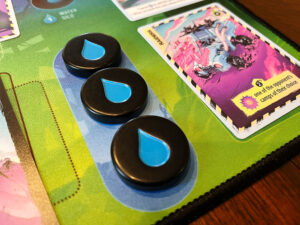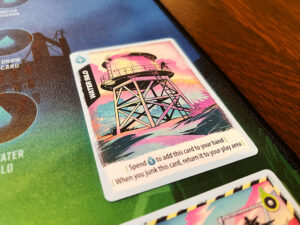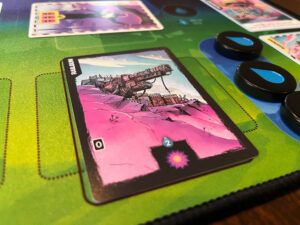 In a post-apocalyptic world, resources are king. And nowhere is that more true than in Radlands, the new dueling game published by Roxley Games. Designed by Daniel Piechnick, Radlands put you in charge of a group of survivors, trying to stop the other player from taking what’s yours.
In a post-apocalyptic world, resources are king. And nowhere is that more true than in Radlands, the new dueling game published by Roxley Games. Designed by Daniel Piechnick, Radlands put you in charge of a group of survivors, trying to stop the other player from taking what’s yours.
There are no shortage of dueling games for players to bring to their tabletops, so can Radlands compete with the likes of Magic: The Gathering, Dice Throne, and Ashes: Reborn for your gaming dollar? Time to find out!
Gameplay Overview:
Each game starts with a draft where players will choose their three camps for the game. There are 34 camp cards in total and every one is unique. Each camp has a spot for two people in a column above it. This means that, not counting event cards, a player can have at most 6 people in play at once (two defending each camp).

A player’s turn takes place in 3 parts. First is an event phase where all of your events slide up one position. Any event that started the turn in the first position is resolved. Then you draw a card and replenish your water to 3 tokens. Finally, you perform any actions. These include putting people/events into play (at a cost of water), discarding a card from your hand for their junk effect, or using abilities of people in play already (again, at a cost of water). Most abilities will let you damage or destroy people or camps. However, there are some other types to keep things interesting, like healing your people, drawing cards, or using your raiders.
The ultimate goal is to destroy your opponent’s three camps. Each, like people in play, can take two damage. Do so and you’ll be the king of the Radlands.

Game Experience:
Roxley Games sent over the deluxe edition of Radlands for us to check out, and like their other titles (Dice Throne, Brass Birmginghand), the quality is unquestionably amazing. There is no doubt that Roxley is still in the upper echelon of luxury board game publishers. The artwork, wonderfully illustrated by Damien Mammoliti, Manny Trembley, and Mr. Cuddington, is nothing short of stellar. Two neoprene playmats are housed in a large box, which also holds a case for the games cards, tokens, and rules. In short, Radlands hits all the marks for the quality and amazing production values.

But while bling is nice, it’s the gameplay that matters. And Radlands is pretty great. As a dueling game, it can be hard for games to avoid just being a new Magic: The Gathering but with a different theme. Yet this one feels pretty unique. First of all, the resources in the game are super tight. You have three water on a turn to use (occasionally 4), but much like a real post-apocalyptic leader, everyone will be demanding some of it. Want to put a person into play or use the ability on your rail gun? It’s going to cost you some of that precious resource. This is one of those games where you can’t possibly do all that you want in a turn, so you have to figure out the most efficient use of your H20.
This means that Radlands is also full of hard choices to make. Take playing a person to your tableau for instance. The people in front of a camp can give it a layer of protection (although not always), so where you position your people is as important as which person you put out. When you have that person with a great special ability, you need to decide between exposing them by putting them in front of a camp by themselves, vs hiding them behind another person to keep them alive longer.

To go along with the hard water choices, you’ll also have a limited supply of cards in your hand. Your opening hand is balanced by what camps you play, so you can start the game with anywhere from 1-3 cards. But after that, you are only drawing one per turn (short of spending water to get more). While this adds another layer of tightness to the game, it also feels like it has the ability to affect the game more than you’d think. Only drawing one card a turn, and making extra draws painful to do, means an unlucky draw can really put you behind your opponent. In one of our games, I drew an event four turns in a row. While events can be really great, they are useless for protecting your camp. Needless to say, my camps were quickly demolished. Thankfully though, this kind of bad run in luck was pretty rare in our tests.
Finally, I liked that players were drawing from a shared deck. There is no deck construction, rare cards, or other aspects to worry about. Whether that is a plus or minus depends on your view of the dueling genre. And since Radlands is all contained in one box, you don’t need to worry about lots of purchases to say competitive with your opponent. This isn’t all lifestyle game that will have you racing to the store every month to get the latest booster.
Final Thoughts:
For those looking for a fun, self-contained dueling game, Radlands certainly hits all the marks. Great theme, stellar artwork, tight gameplay, and unique mechanics. There is a lot to love in this little box. As long as you aren’t the type of person who loves to tinker with decks or build around specific card combos, you can get a lot of mileage with Radlands. I will say though that the pacing on this one feels a tad slower than other dueling games. That is due to the tight economy of the game, so don’t expect powerful turns where you steamroll your opponent. This is more akin to a chess match than sending a horde of screaming goblins at your opponent. If those check a bunch of boxes on your list, then definitely give Radlands a try.
Final Score: 4 Stars – Amazing production values and tight gameplay make this a standout game in the dueling genre.
 Hits:
Hits:
• Beautifully produced
• Easy to learn mechanics
• Every camp card is unique
• Tight resource economy
• Fully self-contained
Misses:
• Since card draws are so light, the luck of the draw can hose you sometimes
• won’t appeal to those that like to build decks
Source: Board Game Quest






